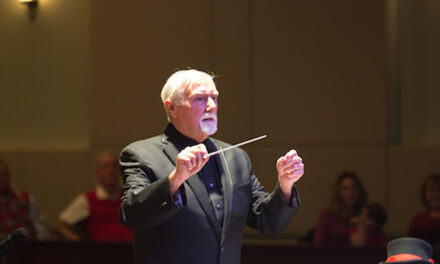Triangle Opera Studios presented “An Evening of Operatic and Oratorio Favorites” in the gracious sanctuary of First Presbyterian Church in downtown Durham on a most pleasant summer evening. The artists were Stephanie Thurm, soprano, and Jianghai Ho, tenor, with the impeccable David Heid at the piano.
Ho majored in music at Duke University where he continues his involvement with the Duke University Opera Workshop and is active in the early music Duke Vespers Ensemble. He is currently refining his vocal skills with Christine Weidinger, distinguished internationally known soprano.
Thurm is a graduate of Meredith College’s Music Department where she was active as a singer and a stage director. She has sung a wide variety of operatic arias and Broadway songs and is currently studying with Christine Weidinger.
Heid is well-known to Triangle audiences and highly sought after as an accompanist. His gifts include a skill to support and enhance vocal soloists he accompanies and an ability to capture an almost orchestral quality on the keyboard.
The program opened with Ho singing two recitatives and airs from Handel’s immensely popular Messiah. “Comfort Ye My People,” “Ev’ry Valley Shall Be Exalted,” “He That Dwelleth in Heaven,” and “Thou Shalt Break Them with a Rod of Iron” introduced the audience to Ho’s powerful voice and a demonstration of his skills in baroque oratorio. His vocal control was outstanding and his mastery of Handel’s melismatic passages was near flawless.
As her opening selection, Thurm chose “Du bist der Lenz” (You are the Spring … for which I have been longing), Sieglinde’s ecstatic response to Siegmund’s “Wintersturme” in Act I of Wagner’s Die Walküre. There was no doubt from the opening measures of the Wagnerian capacity of her voice; a big sound, rich in quality and broad in range and scope.
This was followed by another Wagnerian aria, “Traft ihr das Schiff?” (Have you seen the ship?) from Der fliegende Holländer. This is one of those arias in which Wagner gives us a basic summary of the opera, just to make sure we don’t miss anything. It is very difficult, with a wide range of emotion from tender affection to wild fear to deep longing. Thurm communicated all these emotions with very fine vocal control, sturdy dynamics and subtle staging gestures.
Ho returned to the stage with the “Ingemisco” (a prayer for mercy) from Verdi’s Requiem and “Non piangere, Liü” (Do not cry, Liu) from Puccini’s last opera (unfinished), Turandot. Liu is secretly in love with Calàf and weeps when he accepts Turandot’s three-riddle challenge which seems to mean certain death for him. Both of these selections require severe control over vocal production to communicate pleading and tenderness. Ho was masterful and made the most of his naturally warm tenor timbre and his cultured vocal control to effect a moving presentation.
This was followed by another phenomenally challenging aria from Turandot: “In questa reggia” (In this Kingdom) sung by Thrum. High Cs, aggressive text, tender sensitivity, near madness – all were here in a brilliant package of fireworks, and she held back not a whit. There was one high C that was cut a little short when the voice threatened to falter, but this is not a sign of weakness, but of artistic intelligence.
After intermission, Thurm returned to Wagner for the glorious paean of Elizabeth to the hall of songs from Act II of Tannhäuser; “Dich, teure Halle” (Dear hall, … I greet thee once again).
Here is a good place to point out her excellent comfort with the German and Italian languages and her ability to match the vocal line with the meaning of the text.
Ho did a splendid presentation of “Kuda, kuda vi udalilis” (Where, where have you gone…?) from Tchaikovsky’s Eugene Onegin. An aria of regret and longing sung by the playboy at the end of the second act, it is a frequent favorite of opera recitalists. Here too, we must comment on Ho’s command of the Russian language.
Thurm rounded out her portion of the recital with “Son giunta! … Madre, pietosa Vergine” (… Mother, merciful Virgin) from Verdi’s La Forza del Destino and “To This We’ve Come” from Gian Carlo Menotti’s The Consul. Both of these represent challenges, musically and dramatically, that Thurm soared through. She did an especially effective job of selling the song – and herself with the Menotti selection which was sung in English.
Bringing the concert to a marvelous conclusion, Ho chose the bittersweet aria “I’m Not a Boy” from André Previn’s A Streetcar Named Desire, sung convincingly in English. Then to top it all; one of the most gorgeous romantic moments in opera – Don José’s “Flower Song” from Bizet’s Carmen. This was Ho at his best, using his fine mellow voice, delivering the song as though he had been singing it all his life, convincing the audience (if not Carmen) that his passion was unmatchable to any other human experience. It was so fine.
We would hope to hear more of these committed young singers. Both have powerful voices they know how to project and control. With a few more years and opportunities to strengthen their wings; who knows where we may see and hear them soaring?











